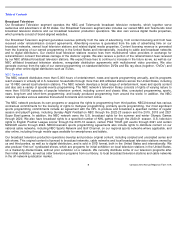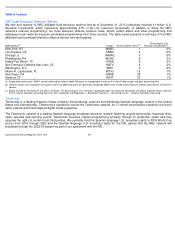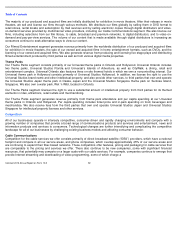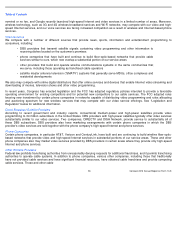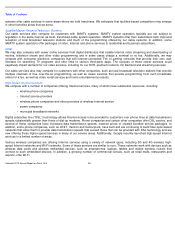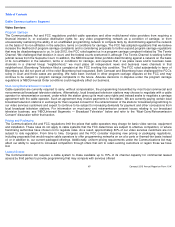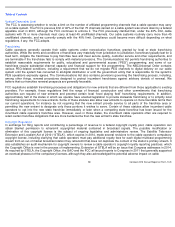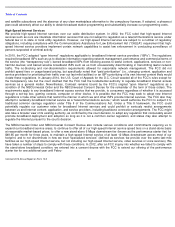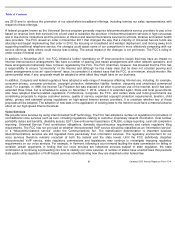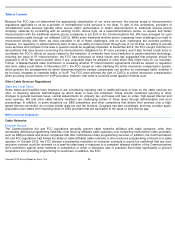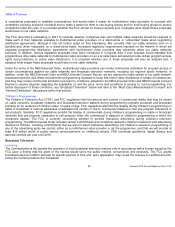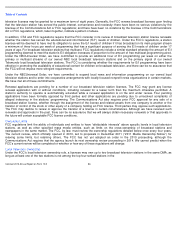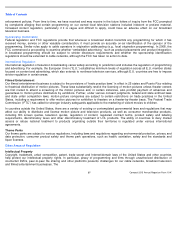Comcast 2013 Annual Report Download - page 22
Download and view the complete annual report
Please find page 22 of the 2013 Comcast annual report below. You can navigate through the pages in the report by either clicking on the pages listed below, or by using the keyword search tool below to find specific information within the annual report.
Table of Contents
Cable Communications Segment
Video Services
Program Carriage
The Communications Act and FCC regulations prohibit cable operators and other multichannel video providers from requiring a
financial interest in, or exclusive distribution rights for, any video programming network as a condition of carriage, or from
unreasonably restraining the ability of an unaffiliated programming network to compete fairly by discriminating against the network
on the basis of its non-
affiliation in the selection, terms or conditions for carriage. The FCC has adopted regulations that we believe
increase the likelihood of program carriage complaints and is considering proposals to further expand program carriage regulations
that may be disadvantageous to us. In July 2012, the FCC ruled against us in a program carriage complaint initiated by The Tennis
Channel. We challenged that decision in court, and the federal courts overturned it, although The Tennis Channel is seeking further
judicial review from the Supreme Court. In addition, the NBCUniversal Order prohibits discriminating against a network on the basis
of its non-
affiliation in the selection, terms or conditions for carriage, and requires that, if we place news and/or business news
channels in a channel lineup “neighborhood,”
we must place all independent news and business news channels in that
neighborhood. Bloomberg Television filed a complaint at the FCC invoking this condition. The FCC ruled substantially in favor of
Bloomberg but did not grant all of the relief Bloomberg had requested. Both Comcast and Bloomberg have challenged the FCC’
s
ruling in court and those cases are pending. We have been involved in other program carriage disputes at the FCC and may
continue to be subject to program carriage complaints in the future. Adverse decisions in disputes under the program carriage
regulations or NBCUniversal Order conditions could negatively affect our business.
Must-Carry/Retransmission Consent
Cable operators are currently required to carry, without compensation, the programming transmitted by most local commercial and
noncommercial broadcast television stations. Alternatively, local broadcast television stations may choose to negotiate with a cable
operator for retransmission consent, under which the station gives up its must-
carry rights and instead seeks to negotiate a carriage
agreement with the cable operator. Such an agreement may involve payments to the station. We are currently paying certain local
broadcast television stations in exchange for their required consent for the retransmission of the stations’
broadcast programming to
our video services customers and expect to continue to be subject to increasing demands for payment and other concessions from
local broadcast television stations. For information on must-
carry and retransmission consent issues relating to our broadcast
television business, see “NBCUniversal Segments — Broadcast Television” below and refer to the “Must-
Carry/Retransmission
Consent” discussion within that section.
Pricing and Packaging
The Communications Act and FCC regulations limit the prices that cable operators may charge for basic video service, equipment
and installation. These rules do not apply to cable systems that the FCC determines are subject to effective competition, or where
franchising authorities have chosen not to regulate rates. As a result, approximately 80% of our video services customers are not
subject to rate regulation. From time to time, Congress and the FCC consider imposing new pricing or packaging regulations,
including proposals that would require cable operators to offer programming networks on an a la carte or themed-
tier basis instead
of, or in addition to, our current packaged offerings. Additionally, uniform pricing requirements under the Communications Act may
affect our ability to respond to increased competition through offers that aim to retain existing customers or regain those we have
lost.
Leased Access
The Communications Act requires a cable system to make available up to 15% of its channel capacity for commercial leased
access by third parties to provide programming that may compete with services offered
17
Comcast 2013 Annual Report on Form 10
-
K




